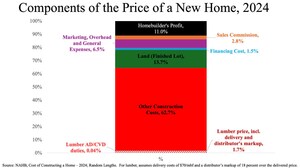
U.S. Lumber Coalition Seriously Concerned by British Columbia Log Export Policy Changes
WASHINGTON, Feb. 26, 2013 /PRNewswire-USNewswire/ -- The U.S. Lumber Coalition is seriously concerned by the recent announcement of log export policy changes in British Columbia (BC), particularly an increase in the "fee in lieu of domestic manufacturing" applied to many log exports that will take effect on March 1.
Log export restrictions have the effect of insulating BC lumber mills from world market prices for logs, which have increased significantly in recent years as China and other countries have increased their demand for North American logs. The recent announcement of measures to tighten log export restrictions on the BC Coast will allow BC lumber producers to pay even further below-market prices for their log inputs.
"In effect, BC has increased the implicit subsidy from log export restrictions for BC Coast lumber mills," said Luke Brochu, Chairman of the Coalition and President of the family-run Pleasant River Lumber Company in Maine. "This gives BC Coast lumber mills a greater advantage in the U.S. market, at the expense of U.S. mills that pay full market price for their inputs," he explained.
Logs harvested from public or private lands in BC must be advertised to local mills before they can be exported. If a local mill offers to pay the prevailing domestic log price – which can be much lower than the export price – for a particular log sort, export of that sort is prohibited. Further, even when permission to export is granted, a "fee in lieu of domestic manufacture" is assessed on logs harvested from public and some private land. This fee is often much greater than the price that BC charges to harvest standing timber on public land. Effective March 1, the "fee in lieu" on the BC Coast will be increased by 20 percent.
The 2006 U.S.-Canada Softwood Lumber Agreement (SLA) is a trade agreement under which the U.S. industry gives up its rights to invoke U.S. unfair trade laws on softwood lumber from Canada, in return for Canada's agreement to impose export taxes and quotas on Canadian lumber when lumber prices fall below certain levels. A key provision of the agreement is that Canadian provinces may not modify their timber pricing systems in ways that move them further away from market conditions. The increase in the "fee in lieu" would appear to be inconsistent with this requirement of the trade agreement.
"The Coalition has brought this matter to the attention of the United States government," Mr. Brochu stated. "We have asked them to raise this issue urgently with their Canadian counterparts, and we urge our government not to hesitate to defend U.S. rights under our trade agreement with Canada."
About the U.S. Lumber Coalition
The U.S. Lumber Coalition is an alliance of large and small lumber producers from around the country, joined by hundreds of thousands of their employees, and tens of thousands of woodland owners. The Coalition is united in opposition to Canada's unfair lumber-trade practices, including the gross under-pricing of timber on government-owned lands. For more information, please visit the Coalition's website at www.uslumbercoalition.org.
SOURCE U.S. Lumber Coalition






Share this article